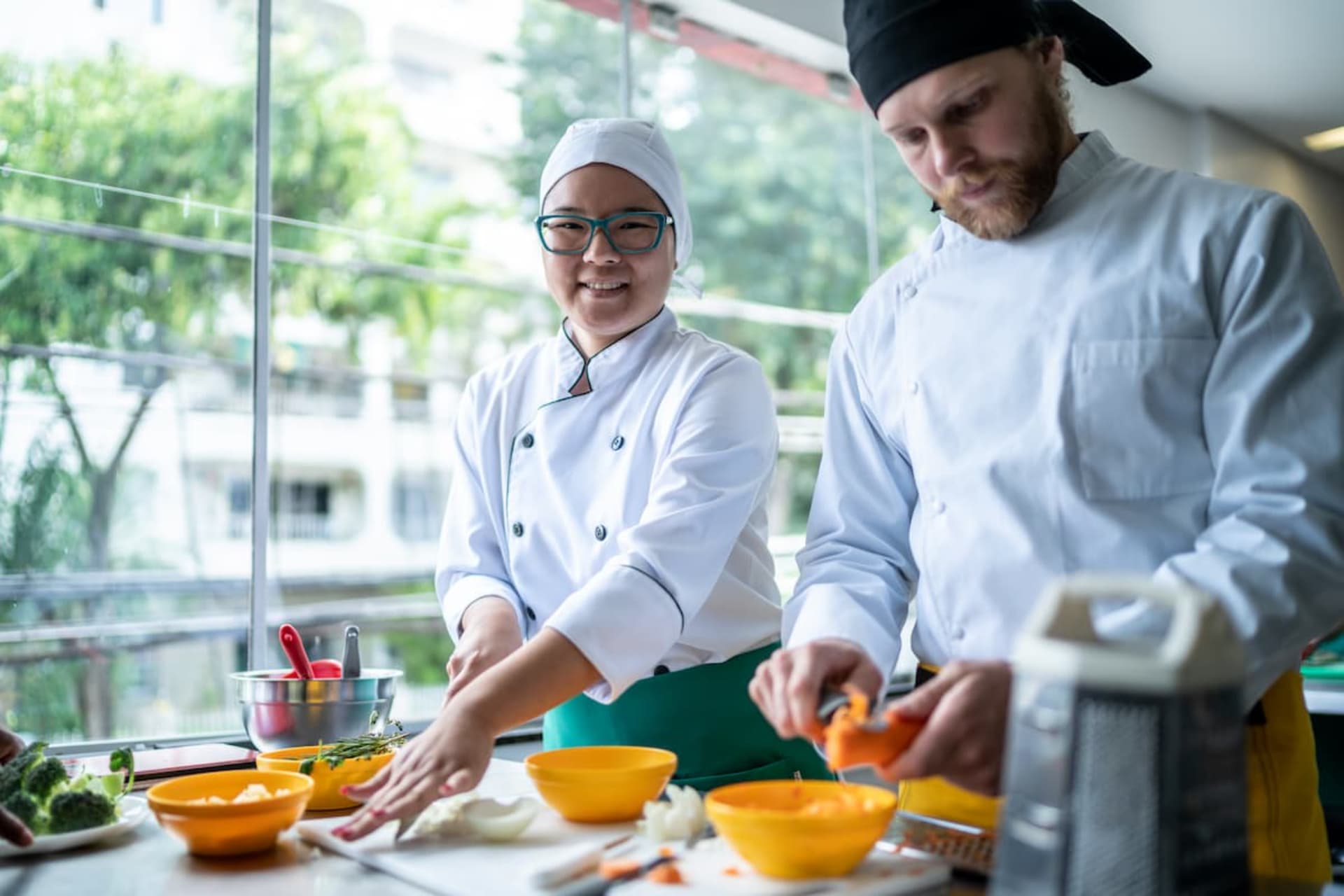Why are culinary apprenticeships so important?

Employment opportunities for chefs and head cooks are projected to grow by 5% from 2022 to 2032, faster than any other occupation. These careers in the culinary industry are particularly exciting for those passionate about food. Entering this profession involves embracing a path rich with challenges and rewards. And one of the best ways into it is through culinary apprenticeships, which offer hands-on learning under experienced chefs and provide invaluable insights into kitchen operations. These placements emphasize practical skills over theoretical knowledge, preparing aspiring cooks for the rigors of professional kitchens.
If you're considering pursuing a culinary career, this article will tell you why apprenticeships are important and how to prepare for a placement that could positively impact your future career.
What are culinary apprenticeships?
Hands-on training programs in professional kitchens offer aspiring chefs the chance to learn directly from experienced mentors. Such apprenticeships are designed to teach practical skills and techniques essential for a successful chef career. Participants gain first-hand experience by working alongside seasoned professionals, preparing various dishes and mastering different cooking methods.
Programs typically combine classroom instruction with on-the-job training. Apprentices might also attend lectures or workshops to learn about food safety, kitchen management and menu planning. This ensures they understand the theory and get to practice it under the guidance of skilled chefs.
The structure of these training programs often includes a progression of responsibilities. Beginners might start with basic tasks such as chopping vegetables or prepping ingredients. As they develop their skills, they take on more complex assignments, such as creating sauces or managing a section of the kitchen. This gradual increase in responsibility helps build confidence and competence.
A culinary arts degree is a solid foundation for people who want to work in the food industry. It offers the technical skills and theoretical knowledge they need to prepare for an apprenticeship or future career.

What are the benefits of culinary apprenticeships?
Training programs in professional kitchens bridge the gap between theoretical knowledge and practical application, ensuring participants are well-prepared for their careers. Below, we’ll go over the main benefits of culinary apprenticeships.
Real-world experience
Apprentices work directly in professional kitchens, gaining practical skills that cannot be learned in a classroom alone. For instance, learning to handle the pressure of a busy service is best experienced first hand. This immersive environment teaches resilience and efficiency.
Mentorship from experts
Experienced chefs provide guidance and share their industry secrets. This mentorship is crucial for learning advanced techniques and refining one's style. For example, a seasoned pastry chef might teach a unique method for tempering chocolate you may not find in textbooks.
Networking opportunities
Working in a professional setting allows participants to build valuable connections. These relationships can lead to job offers or recommendations in the future. A trainee might start as an intern and eventually secure a permanent position due to the rapport built during the program.
Hands-on learning
Direct involvement in food preparation and cooking ensures trainees develop practical skills. Tasks such as deboning fish or making a perfect risotto require hands-on practice. This direct application consolidates learning and builds confidence.
Understanding kitchen operations
Participants learn how a professional kitchen is run, including inventory management, hygiene standards and teamwork. Understanding these operational aspects is essential for anyone aiming to run their own kitchen. Knowing how to manage supplies efficiently can significantly reduce waste and costs, for example.
Career advancement
Completing an apprenticeship often leads to better job prospects. Employers value the comprehensive training and practical experience gained through these programs. An apprenticeship graduate might be preferred over someone without this hands-on experience for a chef position.
Why culinary apprenticeships are important
Programs offering hands-on training in kitchens are essential for the food industry. They shape future chefs and promote excellence in cooking, providing extensive training that impacts individuals and the entire culinary industry. We’ll discuss why they’re so important below.
Skill development
These programs are essential for producing competent, skilled chefs. Through hands-on training and real-world experience, trainees develop the practical skills necessary for high-quality food preparation and service. This comprehensive approach ensures students are well-prepared to meet the demands of professional kitchens.
Industry standards
Culinary apprenticeships help maintain high quality food preparation and service. By learning from experienced professionals, trainees are taught to uphold rigorous standards of quality, hygiene and efficiency. This commitment to excellence is crucial for the reputation and success of the food industry.
Professional growth
Apprenticeships help students grow personally and professionally by providing direct experience in the kitchen. Trainees learn to handle pressure, work efficiently and adapt to different situations. This growth is beneficial for the individual and also for employers who seek well-rounded, capable chefs.
Economic impact
The food industry significantly contributes to the economy and well-trained chefs are essential to this sector. Apprenticeships create a skilled workforce that can support and drive the industry's economic vitality. This includes reducing turnover rates as people with proper training are more likely to stay in their positions, providing stability to businesses.
Culinary tradition
These programs are essential in preserving and passing down traditional techniques. Apprentices learn modern cooking methods alongside traditional recipes and techniques that might otherwise be lost. This preservation of culinary heritage enriches the cultural fabric of the food industry.
Workforce preparedness
Apprenticeships provide comprehensive training that covers all aspects of kitchen work, from food preparation to management skills, ensuring the workforce is well-prepared to meet the demands of the industry.
Essential skills developed through culinary apprenticeships
These programs allow apprentices to develop essential attributes for success in the culinary world. Below is a list of key skills that participants can expect to acquire.
-
Technical skills: trainees learn precision in knife handling, cooking techniques and food presentation. Mastery of these basics lays the foundation for creating high-quality dishes
-
Time management: working in fast-paced environments teaches efficiency and the ability to juggle multiple tasks. Meeting deadlines during busy service periods is crucial for maintaining smooth kitchen operations
-
Teamwork: collaboration with other kitchen staff is essential. Understanding roles and communicating effectively ensures the kitchen runs smoothly. This experience promotes a sense of camaraderie and respect among colleagues
-
Problem solving: kitchens often present unexpected challenges. Trainees learn to think on their feet and develop creative solutions to issues such as equipment failure or ingredient shortages. This adaptability is vital for a successful culinary career
-
Attention to detail: precision is critical in cooking. Apprentices must pay close attention to measurements, presentation and flavor balance. This meticulousness ensures consistency and quality in every dish
-
Sanitation and safety: maintaining hygiene standards and safe practices is fundamental in professional kitchens. Apprentices learn proper cleaning techniques and how to prevent food-borne illnesses
-
Menu planning: understanding how to create balanced and appealing menus is an important skill. Apprentices learn to consider seasonality, cost and dietary restrictions when planning meals
-
Customer service: engaging with diners and receiving feedback helps aspiring culinary professionals understand the importance of customer satisfaction. This interaction creates a service-oriented mindset essential for success
Tips for apprenticeships
Selecting the right training program can significantly impact your growth in the food industry. These tips will help you make the most of your training experience.
Choose the right program
With various chef internships available, selecting one that aligns with your skills and career goals is key. Some offer paid on-the-job training, while others are part of a culinary education for college credit. Independent apprenticeships typically provide hands-on experience in established restaurants. Some programs may also offer the chance to train with a specific restaurant brand, potentially leading to employment in the organization upon completion.
Study experienced chefs
Cooking requires diligent study and practice. Prepare by following the careers of respected chefs, visit their restaurants to observe their techniques, read their books or watch their cooking demonstrations. Beyond celebrities, look for professionals sharing their expertise through blogs, websites, videos or social media. Cookbooks can also be valuable resources.
Understand kitchen hierarchy
Professional kitchens have a structured chain of command, with an executive chef leading the team. Familiarizing yourself with the different roles and responsibilities before starting your apprenticeship will help you navigate the kitchen environment effectively. Key positions you will work closely with in a traditional kitchen include:
-
Executive chef
-
Head chef or chef de cuisine
-
Deputy chef or sous chef
-
Station chef or chef de partie
-
Junior chef or commis chef
-
Kitchen porter
Pursue your food passions
If you are interested in a specific type of food preparation, seek a placement focusing on that technique. There are specialized programs in areas such as butchering, meat processing, beverages and baking and pastry arts. Apprenticeships are also available for roles in food management such as catering.
Preparing for a culinary apprenticeship and future career
A culinary arts degree equips individuals with the skills and knowledge necessary for entering an apprenticeship and forging a successful career in the food industry. The curriculum offers comprehensive instruction in fundamental cooking techniques, menu planning and food safety. Students also gain hands-on experience in kitchen operations and management, preparing them to handle the practical demands of an apprenticeship.
Cookery programs often include nutrition and ingredient sourcing courses, encouraging a deep understanding of food quality and sustainability. This prepares graduates for the rigors of professional kitchens and cultivates a mindset focused on innovation and adaptation.
A degree in culinary arts also provides opportunities for networking with industry professionals and exposure to different cooking traditions. These connections are invaluable when seeking apprenticeship placements and future employment opportunities in various sectors of the culinary industry, such as fine dining restaurants, catering businesses or even food media.
Conclusion
Culinary apprenticeships play a key role in shaping the future of students and the broader food industry. These programs offer hands-on training and mentorship, providing invaluable real-world experience beyond theoretical knowledge. By immersing themselves in professional kitchens under the guidance of seasoned chefs, students refine their chef skills, resilience and efficiency in high-pressure environments.
For aspiring kitchen professionals, an apprenticeship program provides a launchpad for career advancement, offering opportunities to network with industry professionals and secure job placements. The comprehensive training received not only equips apprentices with technical expertise but also instills a commitment to excellence and customer satisfaction.
A degree from a prestigious culinary school will ensure you have the skills, knowledge and expertise you need to succeed in the world of cooking arts.


